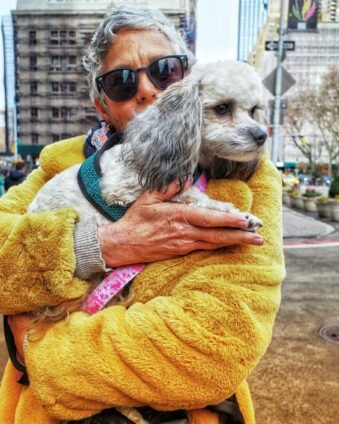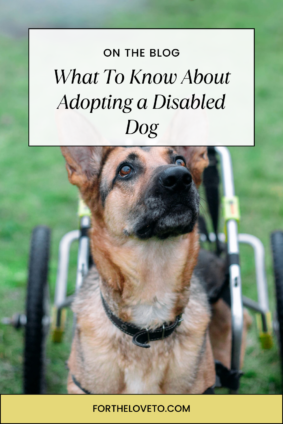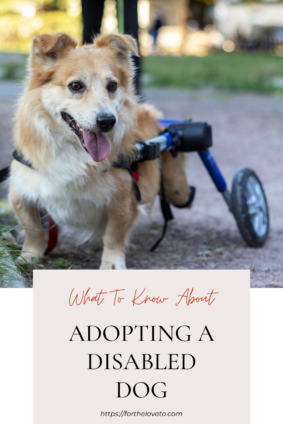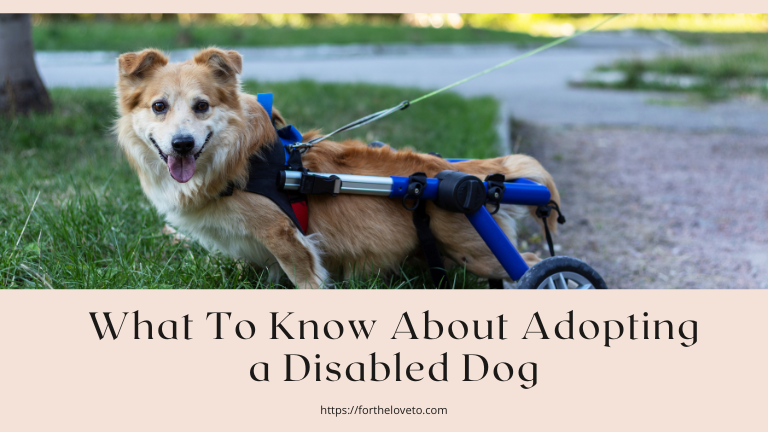You probably have friends who have rescue dogs who are deeply devoted to their adoptive pet parents. They may have been a little shy or a little jumpy as they got used to the reality of a forever home.
But what about the dogs that don’t get adopted as often, the dogs with special needs? Before you take the leap of taking on a dog with differences, explore what to know about adopting a disabled dog.
Why Do You Want To Adopt?
The first question I would ask myself is, why do I want to adopt? Would it be to teach my child about empathy and responsibility? Or do I feel a desire to give a home to a dog that may otherwise struggle to find one? Understanding your motivation for adopting a disabled dog sets the foundation for your commitment to care for them.
Is the Family All In?
Next, I’d consider whether everyone in the family was on board with the idea. Adopting a disabled dog is a family commitment that requires everyone’s understanding, patience, and help. I’d sit down with my family and have an open discussion about the responsibilities and changes that would come with adopting a disabled dog.

Can You Afford the Veterinary Costs?
One of the most significant things to know before adopting a disabled dog is that caring for a special needs pet can be expensive. The potential veterinary costs associated with caring for a disabled dog, including additional vet visits, medication, and special diets, can be substantial.
Some adoptive pet parents of disabled dogs must also overcome myths about mobility aids as they shop for a pet wheelchair.
How Will You React If People Stare or Ask Rude Questions?
It’s unfortunate, but some people may stare or ask insensitive questions about your dog’s disability. Think about how you would react to such situations and how you’d discuss them with your family. Preparing for these scenarios can help you handle them gracefully when they occur.
Are You Physically Able To Care for a Disabled Dog?
What if the dog you fell in love with is a German Shepherd or an Alaskan Husky that has difficulty walking? You’d need to be honest with yourself about whether you’re physically capable of helping a big dog in and out of a pet wheelchair or diapering an incontinent canine that’s as big as your school-age kid.

Who Will Care for the Dog if You Go on Vacation?
Finding a clean, safe, trustworthy kennel for any dog is hard enough, but it can be even trickier for pets with disabilities. How would you handle care for a disabled dog if you go out of town?
An alternative to a kennel would be to find a dog-friendly destination and take the dog with you. But you’d still have to deal with the occasional stare, the reactions of other dogs to a disabled newcomer, and the potential limitations of your activities when you want to explore beyond your pet-friendly accommodations.
The decision to adopt a disabled dog shouldn’t be taken lightly. But with careful consideration, I believe adopting a disabled dog can be a rewarding and fulfilling experience for the whole family.


Thank you for supporting my blog! Please note that this post contains affiliate links, and I may receive payments for clicks, purchases, and/or registrations made through these links. It’s important to mention that ForTheLoveTo.com is a proud participant in the Amazon Services LLC Associates Program, an affiliate advertising program designed to provide a means for sites to earn advertising fees by advertising and linking to Amazon.com. Your support enables me to continue creating valuable content, and I genuinely appreciate it.

Discover more from For The Love To
Subscribe to get the latest posts sent to your email.

